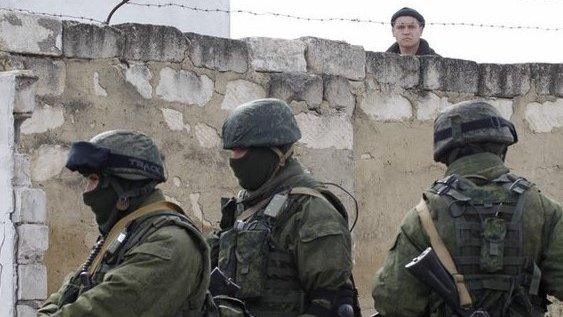Russian menace pushes Sweden towards Nato
- Published
Why Sweden is concerned about Russian provocation
In the middle of the Baltic Sea, a chilly east wind blows across a former Cold War frontier.
After more than 20 years of strategic irrelevance, and thanks to increasingly unpredictable Russian behaviour, Gotland is back in the spotlight.
It is the latest chapter in the island's long military history, and one returning soldier is thrilled.
"It's almost a dream come true," says Lt Col Stefan Pettersson.
After a decade in civilian life, Pettersson is back in uniform, preparing to take command of the Swedish island's defences.
As he scans the snowy landscape where he and his colleagues used to train, he is still pinching himself.
"I always had a dream to come back as an officer and to do it here on Gotland and establish a new unit, it's perfect," he tells me.
The new Gotland battlegroup, expected to take shape by the end of next year, will number 300 full- and part-time soldiers.
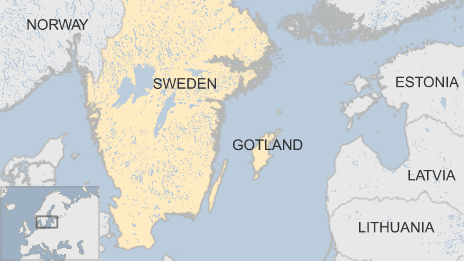
Getting the infrastructure ready, even for this small force, will take time. Having turned its back on Gotland 20 years ago, the Swedish military is starting again from scratch.
The former barracks have long since been turned into local government offices.
In a frigid, air-conditioned warehouse, deep in the forest, 14 German-made Leopard tanks are already waiting for their crews to join them.
It's all a far cry from the 15-20,000 military personnel who were stationed on Gotland at the height of the Cold War, but officials say reinforcements can be sent in quickly if needed.
Febrile atmosphere
"You are in the middle of Nato on one hand and Russia on the other," Pettersson says. "Gotland is in the middle of this."
And while "this" doesn't yet represent a return to Cold War realities, it does refer to an increasingly febrile Baltic atmosphere.
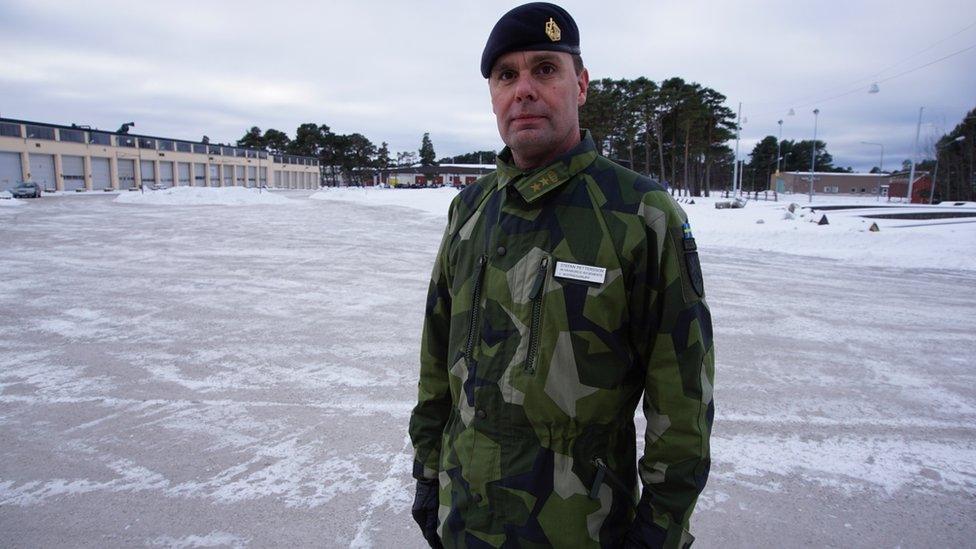
Lt Col Stefan Pettersson is taking command of the Gotland defences
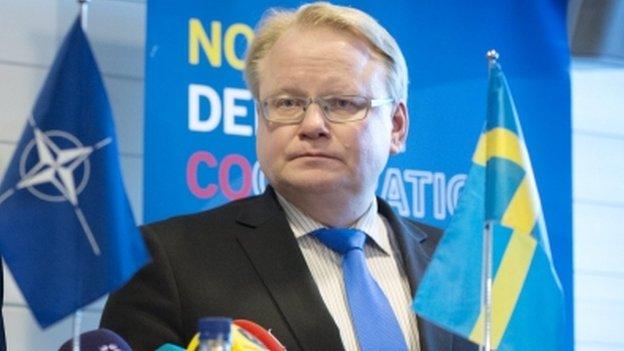
Peter Hultqvist is concerned about Russian military activites in the Baltic
Swedish officials say Russian military aircraft frequently infringe Swedish airspace. In 2014, the country was transfixed for a week by reports that a Russian submarine was lurking in the shallow waters of the Stockholm archipelago.
"What we can see is that there are more exercises, more military activities in the Baltic Sea," Defence Minister Peter Hultqvist tells me. "We can also see more proactive activities, flying close to our aircraft."
It's one thing to see what the Russians are doing, but what does it all mean? No-one in Sweden believes that Russia would launch an unprovoked attack on a country outside the former Soviet Union, but Moscow is seen as increasingly unpredictable.
Sweden says there have been three sightings of a submarine near Stockholm since Thursday
"Did we understand, before it happened, the annexation of Crimea? Did we understand that they were very close to starting something in Eastern Ukraine?" says Michael Byden, Supreme Commander of Sweden's armed forces.
"This is one of the great challenges right now: what are they up to and why do they do it?"
Some analysts believe Russia's behaviour has more to do with shoring up Vladimir Putin's domestic support than probing Swedish defences.
But whatever the rationale, it's already prompted the Swedish government to boost defence spending and shift the military's focus to regional security after two decades in which international operations took precedence.

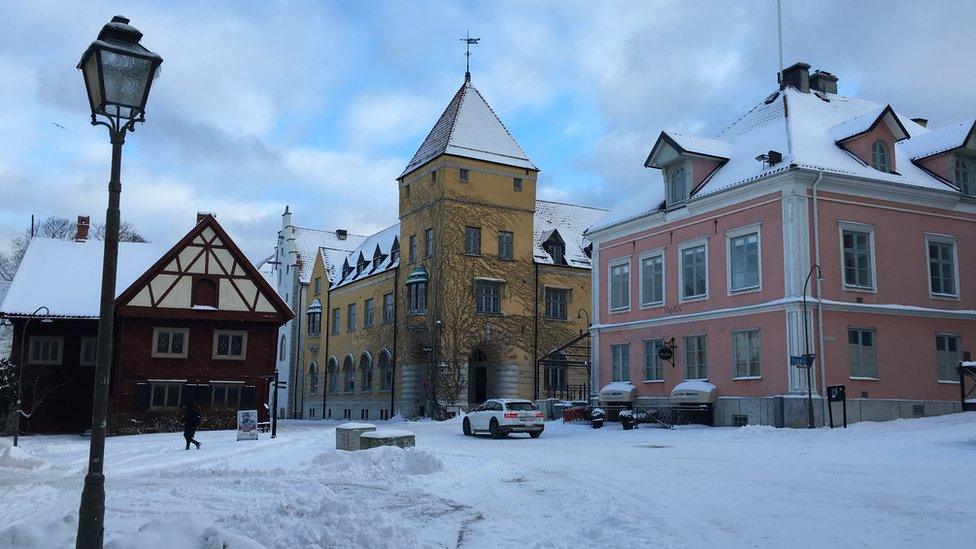
Visby
Gotland:
Sweden's largest island.
Ancestral home of the Gutes.
Population is approximately 57,000, of which about 24,000 live in the main town, Visby
The island of Gotland and the other areas of the province of Gotland make up less than one percent of Sweden's total land area.

It has also triggered a lively debate about whether Sweden should join Nato.
Opinion polls conducted last year showed, for the first time, almost half of all Swedes in favour, external, with a slightly smaller number opposed. This represents a sharp recent increase. In 2012, fewer than one in five Swedes were in favour.
Russian behaviour only partly explains the sudden jump, says Jacob Westberg, who lectures in strategy at the Swedish Defence University in Stockholm.
"The first factor is an increased awareness of the sad state of the Swedish armed forces when it comes to defending Swedish territory," he says.
Weak defence
In December 2012, the former chief of staff triggered consternation with his admission that Sweden's military could only defend itself for a week in the face of an attack.
"This resulted in a dramatic debate," Westberg says. "Is it true? Could it be this bad? And it was."
Military chiefs are still embarrassed by the 2013 "Russian Easter" incident, external, when six Russian aircraft carried out a simulated attack on Stockholm, and the Swedish air force failed to scramble any of its jets.
Sweden already co-operates closely with Nato members. Its forces are more "interoperable" than many alliance members. In 2011, Swedish Gripen jets participated in the Nato-led intervention in Libya.
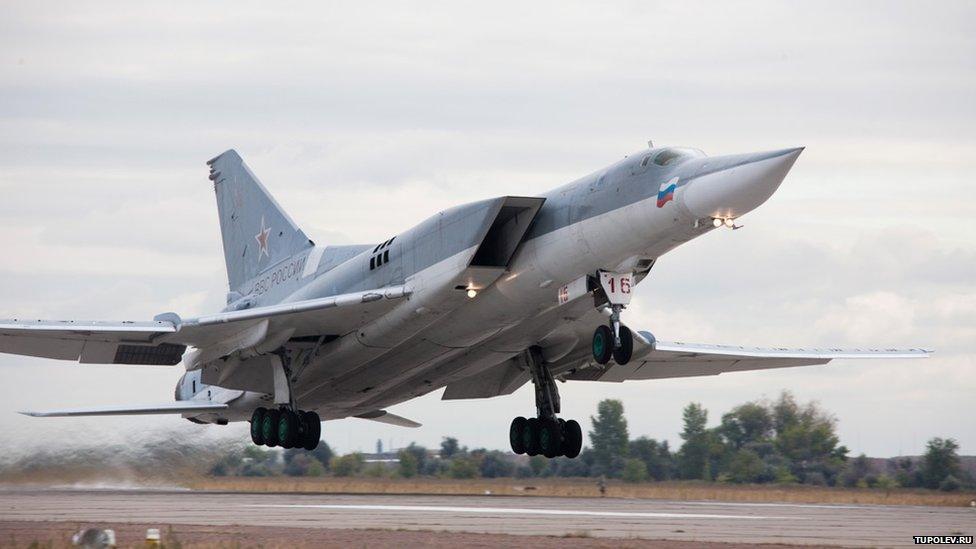
Tu-22M3 bombers were used to simulate an attack on Stockholm in 2013
But a country which hasn't fought a war since 1814 and which prides itself on a tradition of neutrality and non-alliance is reluctant to take the logical next step.
Despite its close relationship with Nato, Jacob Westberg says the country is pursuing a "free-riding strategy".
"We are letting the security of our own country be dependent on other states' ability to deter Russia from further aggression," he says.
During the "Russian Easter" incident, it fell to two Danish jets, operating as part of Nato's Quick Reaction Alert, to scramble from a base in Lithuania.
Until Sweden is fully integrated in a collective effort to defend the Baltic region, Westberg says, Stockholm won't be seen as a fully reliable partner.
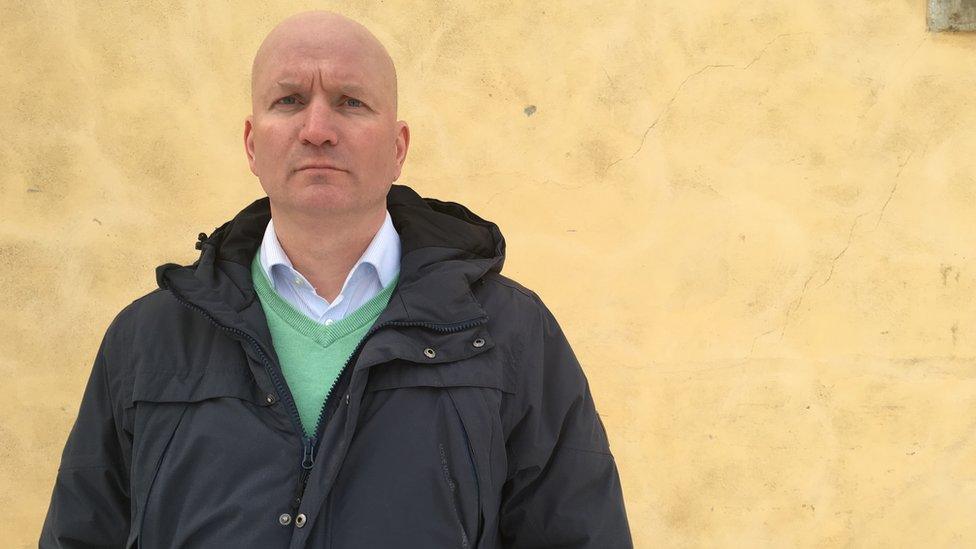
Joakim Martell welcomes the focus on Gotland
Back in Gotland, one of Stefan Pettersson's former colleagues, retired colonel Joakim Martell, calls the government's renewed attention on this strategic island "a good start".
But a man who spent 15 years of his military career in Gotland says Sweden needs to go further.
"It's also important to have… a more strategic view on the island as part of the security network we're connected to," he says.
"To be quite clear, that is part of the Nato network that Sweden… should be connected to more than we are today."
- Published24 October 2014
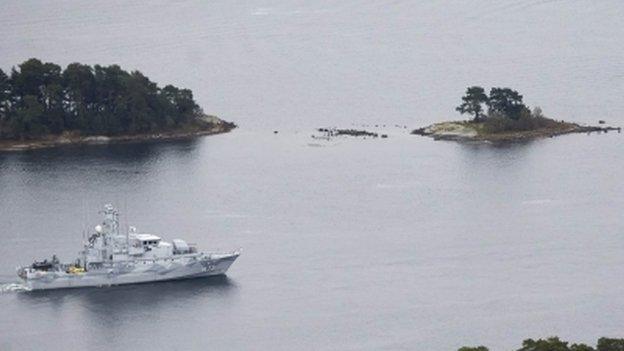
- Published10 November 2014
